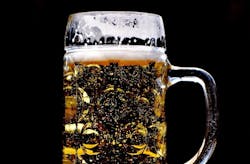Australian Brewery Uses Algae for Beer Production
Australian brewery Young Henrys is fighting climate change by incorporating algae into beer production.
Since the fermentation process that occurs during beer production releases massive amounts of carbon dioxide, the in-house cultivated algae not only absorbs the CO2, but it produces as much oxygen as two and half acres of wilderness, reported Food Tank.
“This is a unique project and the focus is not to profit,” said Oscar McMahon, Young Henrys’ Co-Founder. “It is to create something that we can then share with other people to adapt and use.”
Young Henrys signed onto this project with the University of Technology Sydney in order to reach carbon neutrality. Young Henrys uses two bioreactors to cultivate algae. The first is a control which contains CO2, oxygen, and algae. The second contains the same three components, but is connected to a fermentation tank, reported Food Tank. As the fermentation process produces more CO2 the gas flows into the bioreactor.
At the end of each day, the control bioreactor consistently contains 50% less algae, reported McMahon. McMahon hopes that this system can not only lower CO2 emissions from beer production, but ultimately convert it into oxygen as well.
This specific project will continue for one more year, reported Food Tank.
Young Henrys is currently experimenting to incorporate algae into food, pharmaceuticals, and bioplastics as well.
In order to scale up algae production and develop new products, McMahon and Young Henrys are in consultation with engineering and beer industry groups.
According to McMahon, the beauty of algae and the microorganisms used in beer fermentation are “yin and yang organisms, similar things that live in big tanks of liquid that conduct opposite yet correcting jobs.”
